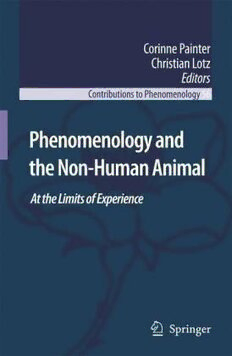
Phenomenology and the non-human animal : at the limits of experience PDF
Preview Phenomenology and the non-human animal : at the limits of experience
PHENOMENOLOGY AND THE NON-HUMAN ANIMAL CONTRIBUTIONS TO PHENOMENOLOGY IN COOPERATION WITH THE CENTER FOR ADVANCED RESEARCH IN PHENOMENOLOGY Volume 56 Editor: JohnJ.Drummond,FordhamUniversity EditorialBoard: ElizabethA.Behnke,Ferndale,WA,USA DavidCarr,EmoryUniversity StephanGaltCrowell,RiceUniversity LesterEmbree,FloridaAtlanticUniversity BurtHopkins,SeattleUniversity JoséHuertas-Jourda,WilfridLaurierUniversity WilliamR.McKenna,MiamiUniversity AlgisMickunas,OhioUniversity J.N.Mohanty,TempleUniversity TomNenon,TheUniversityofMemphis ThomasM.Seebohm,JohannesGutenberg-Universität,Mainz GailSoffer,Rome,Italy RichardM.Zaner,VanderbiltUniversity Scope Thepurposeofthisseriesistofosterthedevelopmentofphenomenologicalphilosophythrough creativeresearch.Contemporaryissuesinphilosophyotherdisciplinesandinculturegenerally,offer opportunitiesfortheapplicationofphenomenologicalmethodsthatcallforcreativeresponses. Althoughtheworkofseveralgenerationsofthinkershasprovidedphenomenologywithmanyresults withwhichtoapproachthesechallenges,atrulysuccessfulresponsetothemwillrequirebuildingon thisworkwithnewanalysesandmethodologicalinnovations. PHENOMENOLOGY AND THE NON-HUMAN ANIMAL At the Limits of Experience edited by CORINNE PAINTER Washtenaw Community College, Ann Arbor, Michigan and CHRISTIAN LOTZ Michigan State University, East Lansing, Michigan AC.I.P.CataloguerecordforthisbookisavailablefromtheLibraryofCongress. ISBN978-1-4020-6306-0(HB) ISBN978-1-4020-6307-7(e-book) PublishedbySpringer, P.O.Box17,3300AADordrecht,TheNetherlands. www.springer.com Printedonacid-freepaper AllRightsReserved ©2007Springer Nopartofthisworkmaybereproduced,storedinaretrievalsystem,ortransmitted inanyformorbyanymeans,electronic,mechanical,photocopying,microfilming, recordingorotherwise,withoutwrittenpermissionfromthePublisher,withthe exceptionofanymaterialsuppliedspecificallyforthepurposeofbeingenteredand executedonacomputersystem,forexclusiveusebythepurchaserofthework. for Socrates, the feline member of our family Contents Acknowledgments ix 1. Introduction: Phenomenology and the Question of the Non-Human Animal 1 Corinne PAINTER and Christian LOTZ SECTION I: PHENOMENOLOGY, ONTOLOGY, AND ANTHROPOLOGY 2. Attunement, Deprivation, and Drive: Heidegger and Animality 13 Gerard KUPERUS 3. Being Beyond: Aristotle’s and Plessner’s Accounts of Animal Responsiveness 29 Marjolein OELE 4. How Not to be a Jellyfish: Human Exceptionalism and the Ontology of Reflection 39 Ted TOADVINE SECTION II: PHENOMENOLOGY, PSYCHOLOGY, AND LANGUAGE 5. How do Primates Think? Phenomenological Analyses of Non-language Systems of Representation in Higher Primates and Humans 57 Dieter LOHMAR 6. Phenomenology and the Study of Animal Behavior 75 Erika RUONAKOSKI SECTION III: PHENOMENOLOGY AND ETHICS 7. The Intentionality and Animal Heritage of Moral Experience: What We can Learn from Dogs About Moral Theory 85 Charles S. BROWN 8. Appropriating the Philosophies of Edmund Husserl and Edith Stein: Animal Psyche, Empathy, and Moral Subjectivity 97 Corinne M. PAINTER vii viii CONTENTS SECTION IV: AT THE MARGINS OF PHENOMENOLOGY 9. The Human as Just an Other Animal: Madness, Disability, and Foucault’s Bestiary 117 Licia CARLSON 10. The Intertwining of Incommensurables: Yann Martel’s Life of Pi 135 James MENSCH Notes on Contributors 149 Index 153 Acknowledgments The editors of this volume would like to thank Emporia State University (Emporia, Kansas) for supporting this project with a grant, which provided monetary support for our research. We would also like to thank the contrib- utors to this volume, for their insightful and provocative essays, which challenge each and every one of us to rethink our relationship with our non- humananimalneighbors.Finally,wewouldliketothankouranimalfriends, who, in their own way, and without knowing it, were the inspiration for this volume. ix 1 Introduction Phenomenology and the Question of the Non-Human Animal Corinne PAINTER and Christian LOTZ As Max Horkheimer wrote sixty years ago, Moderninsensitivitytonatureisindeedonlyavariationofthepragmatic attitudethatistypicalofWesternCivilizationasawhole.Onlytheforms aredifferent.Theearlytrappersawintheprairiesandmountainsonlythe prospectofgoodhunting;themodernbusinessmanseesinthelandscape an opportunity for the display of cigarette posters. The fate of animals in our world is symbolized by an item printed in the newspapers of a few years ago. It reported that landings of planes in Africa were often hamperedbyherdsofelephantsandotherbeasts.Animalsareconsidered simply as obstructers of traffic.1 The Frankfurt School in general and Horkheimer in particular connects theseobservationstoa“speculativetheoryofreason,”accordingtowhichhe claimed that ever since the re-installment of modern rationality in the 18th Century,allentitieshaveceasedtobeacknowledgedfortheirintrinsicvalue. He claimed, that is, that entities are no longer viewed as worthwhile and significant in their own right, but instead, simply as objects of dispositional power that are thus evaluated on the basis of instrumental reason, i.e., on the basis of their practical value for “some other thing.” In this way, what started as a project of realizing genuine (philosophical) reason and value in our world finally turned towards itself, with the dawn of modern ratio- nality. The (misguided) emancipation of reason from nature, as Horkheimer argues, turned into the rational and organized oppression of nature, which, sincehumanbeingsareapartofnature,forcedhumanreasontoturnagainst itself, and in so doing reveal itself as a most dangerous and destructive substance. Indeed, in its very attempt to liberate itself from nature, reason became the destructive force that guides the history of the Western world, the monstrous effects of which we bear witness to regularly. Not surpris- ingly, “this principle of domination,” as Horkheimer (and Adorno) put their bold claim, “has become the idol to which everything is sacrificed.”2 Sadly, 1 C.PainterandC.Lotz(eds.),PhenomenologyandtheNon-HumanAnimal,1–11. ©2007Springer.
